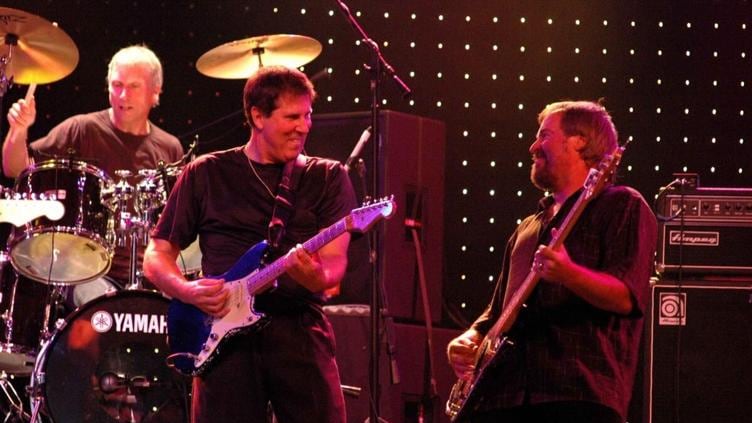Calling the Kingsmen “one-hit wonders” isn’t precisely accurate, yet so undeniably true and so patently irrelevant as to render the term meaningless. A hit like “Louie Louie” has already bestowed such transcendent wonders for so very long that would anyone be surprised to find our grandchildren’s grandchildren pledging fealty?
No, the Kingsmen did not write “Louie Louie.” Richard Berry’s authorship has never been disputed. Moreover, the chords to be strummed and chorus shouted during this weekend’s 24-hour, 70-act mega-performance had already produced a popular cover version filling Northwest dance floors by the time a quintet of Portland teens cut their famously ragged rendition, but the Kingsmen’s shaggy, savage, officially indecipherable take unlocked something primal hidden deep within that snarls through the decades with powers undiminished.
As things go, there are certainly worse cultural legacies. No one’s yet complained that drummer Dick Peterson, the only member of the band remaining from its first 20 years, joined shortly after “Louie Louie” was recorded.
As the troupe prepares to open and close the inaugural “Louie Louie” live marathon running this Saturday through Sunday at Afru Gallery, WW looks behind the music for the unlikely origins of Portland’s original rock stars.
WW: Did the Kingsmen’s success in any way stem from their hometown or would this all have happened anywhere?
Dick Peterson: We were just a local band, and “Louie Louie” was put out locally for sock hops and teen dances and supermarket openings, but once the “obscene” lyrics were banned in Indiana, all of a sudden everybody wanted to see the band. People thought we were subversive, and once J. Edgar Hoover and Robert Kennedy got involved, we became extremely popular. Here we are playing about 400 people a dance, and suddenly William Morris calls wanting to book us on the road for $5,000.
And your first major jaunt?
1964, we went out with the Beach Boys for the entire summer: June, July, August, all around the country.
After that tour, the obscenity charge-based hysteria was in full swing?
Every concert was something different. One night, we’d play a rodeo arena where the dust was flying into your face because kids were dancing on the dirt. The next, we’d play an ice arena that put a tarp over the rink. It’s always been a party everywhere we played.
What happened next for the band?
We stayed on the road. When “Louie Louie” hit, we left home and were gone for five years, except 13 days at Christmas.
How long did the sets last?
Portland dances, we’d usually play three 45-minute sets. When we hit the road, that’s when we started playing for four hours a night, sometimes twice a day. Norm, the bass player, ended up buying these Army test speakers designed by [JBL founder] James Lansing for military use, modified some Bogen stadium amplifiers, and created his own speaker cabinets, which could take more power. That’s what we played on tour.
Did bands on tour share equipment?
No, everyone brought their own stuff. The Beach Boys were using state of the art Fender Showmen, but after the first show, they started using ours. [The Sunn] amps were so much better, and they became so much better that somebody had to create better PA systems to actually mix sound for these big ballparks.
In my opinion, Sunn would probably be a going concern today had Norm and his brother not started a nasty fight over the company. They were forced to be bought out by the court, sued each other and went through a very nasty thing and ended up selling it to Fender who ended up selling all of their interests to CBS. The Sunn building is still there in Tualatin. I drive by it all the time.
Inevitably, bands fall out of fashion...
By 1971, we’d had our run and stopped touring. Then, Animal House hit, all of a sudden we were bookable, and we have been ever since.
Also, of course, the California Cooler commercials helped a great deal. It was huge, and the guys who invented the coolers mixing all the wines were nothing but party so they did a survey with [visionary corporate ad agency] Chiat/Day to figure out what music would reach the largest party audience, and “Louie Louie” won hands down.
Do you remember who came in second? Third?
Stevie Winwood and the Spencer Davis Group with “Gimme Some Lovin’.” Then, um, “Wooly Bully.” We rerecorded all three songs for the commercials.
They asked if we’d be interested in spearheading their branding, and we said sure. Going out on the road with California Coolers was great fun. Chiat/Day created this brilliant new way of doing things with a whole campaign geared around earning the best bang for your buck.
Eventually, the company was sold for a few 100 million to [liquor manufacturer] Brown-Forman, who’d shut it down, but, for two years, we were all over the television. I was like a GEICO gecko. They were big promotions. It was fun.
Who else would be on the bill?
It would just be us playing for two hours. Either we’d be on a beach somewhere, or they’d create one [by dumping] sand in a coliseum. We had 100K in Philadelphia.
Just you guys?
Yeah, just us. We were in South Dakota a few [years] ago, and 50K fans came out just for us.
How many people live in South Dakota?
Twenty, 25 [laughs.] South Dakota’s a crazy place, you know? The motorcycle rally in Sturgis gets 60, 70, 100K every year. Nobody knows where the people come from, but they show up from all over the United States. When we showed up, there were already 50K bikers in the streets. They wanted someone to play this big rock-’n’-roll party [laughs.] Who better than America’s party band?

